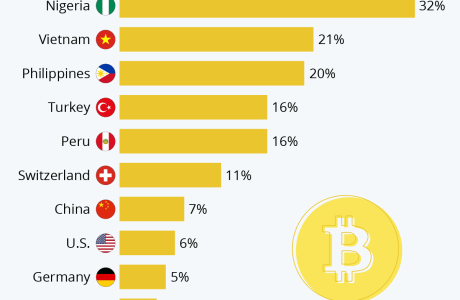Fintech is transforming the financial industry, and the blockchain development organizations in this area have a considerable advantage from now on. The speed and scale of this change will depend mostly on users adopting this new economy. People have already given their verdict – they are tired of black boxes and want to determine how they pay for data and financial transfers.
Now it’s time to dive deep into blockchain technology and see ways your business can profit from it.
Blockchain is a distributed ledger technology (DLT) that allows information to be stored globally on thousands of servers. When two companies are in business together and use cryptocurrency as payment, the agreement forms the “block” in the chain. Blockchain links and secures these blocks using cryptography.
For a deeper understanding, we highlighted the key blockchain features as follow:
Finance is one of the industries that first started implementing IT, and everyday users began to receive benefits from it. Fintech has learned to apply innovative technologies relatively quickly, and now financial organizations are leveraging it to gain more value-adds on the market and improve the operations’ security.
Think about international payments, money transfers, settlements abroad, cash withdrawals at ATMs in distant areas, and swift transactions using just mobile phones. Yes, now it sounds like an ordinary, everyday thing. Nevertheless, it was a tremendous breakthrough when new technological opportunities disrupted the capital market such as mobile internet and digital communications. It stimulated the emergence of entirely new approaches and formed an international financial ecosystem where everyone communicates and exchanges information with each other.
The use of new methods often requires changes in the regulation process, which constrained the transformation of the traditional financial sector in some ways. Today, at the risk of losing the battle to cutting-edge tech companies, conventional financial businesses are eager to adapt approaches and technologies to existing regulations and devote substantial attention to changes in the regulatory system itself. According to Statista, the banking industry has the most extensive blockchain spending, with a market share of almost 30 percent.
Blockchain-based fintech can be the next stage of the financial industry’s evolution, which is likely to remove the middle man, add transparency, and enhance each transaction’s security. If you are a CEO of a financial organization or an expert, it’s essential to understand blockchain’s role in fintech if you want to be a part of this revolution.
The blockchain in fintech can provide more seamless and efficient banking services, from cost reductions to minimizing bureaucracy in traditional banking that benefits both the bank and the clients.
Blockchain is diving into the fintech market, and it’s here to stay.
“Worldwide blockchain in the fintech market is foreseen to grow from USD 231.63 million in 2017 to USD 6700.63 million by 2023, at a yearly growth rate (CAGR) of 75.2% during the prediction period”, specified by Market Research Future.
Blockchain assists in managing data breaking and other fraudulent operations to enable fintech businesses to share and transfer safe and unaltered data through a decentralized network. It will help make data more secure with algorithms even in an encrypted state and help track, comprehend, and audit AI decisions better, thus providing the level of transparency required for the people to trust machine-driven intelligence.
Furthermore, blockchain technology can help eliminate the stock market’s shady tactics such as stock tampering, processing time and charges, and all intermediaries’ commissions.
Andy Martin, a world-class blockchain expert, recently forecasted market changes based on the token economics forced by blockchain and described what exactly it provides:
“Decentralized communities provide certainty of identity, “who am I dealing with”, the certainty of provenance, “what am I buying” and smart contracts give certainty of execution, “if I do this, then I get paid” in these new marketplaces.”
Let’s look into the use of cases of blockchain that describe the real benefits for the finance sphere.
Transferring funds or assets has always been a time-consuming process when using traditional banking. Sometimes sending a mere $100 can take ages while two banks go through all the necessary protocols needed to finish the transaction.
With blockchain implemented in fintech apps, sending money, regardless of the amount, is much faster – what can become a matter of minutes. Blockchain-based transactions occur in real-time, so the recipient will not have to wait for days and weeks until they get money.
Moreover, fintech applications powered by blockchain can drastically reduce the transaction costs enabling direct, P2P transactions that eliminate any middleman, meaning all unnecessary expenses and fees. For instance, remittance costs within the blockchain are 2-3% of the total amount compared with 5-20% withheld by other third parties. According to McKinsey, blockchain solutions for onboarding, regulatory compliance, and fraud could save banks significant amounts.
Fintech and blockchain enable users to determine how they identify themselves and with whom they want to share their identity. Assuming blockchain fintech companies ensure that the registration process is safe and sound, end-users will never have to worry about who the person on the other end of the transaction is. Blockchain in fintech allows customers to use a digital fingerprint, which, like an actual fingerprint, can be used as a unique identifier. It can be stored on a distributed ledger and referenced by any bank in the network.
A smart contract is a self-sustaining protocol implemented in computer code managed by a blockchain that contains a set of rules under which the individuals of that smart contract agree to cooperate. Smart contracts allow performing credible transactions without third parties while ensuring security and credibility.
Furthermore, in a high-level blockchain fintech app, the user needs to register only once. Every following login would never require additional info other than the private key.
Since blockchain is internet-based, it does not need any specific setup for operating. With decentralized systems, fintech companies empowered by blockchain can turn global transactions into swift, usual protocols with only a single requirement – access to the internet.
One more thing to know is that blockchain exists everywhere, making it possible to make person-to-person payments (P2P) transfers worldwide. People can access their data and manage funds from anywhere and all a user needs to perform any transaction is a private key.
It would be a never-before-seen upgrade to how finances are being managed now.
Since we’re heading for a single network available to anyone who has an internet connection, the need for fast and efficient transactions auditing would be at an all-time high.
Building blockchain-based apps will enable fintech developers to create first-tier auditing protocols. Blockchain functions as a storage of linear blocks that add a new entry for every further action, but it never tampers with old blocks no matter how big the system gets. It provides all the data needed to conduct a quick and secure audit of transactions, ensuring high-level transparency.
At NIX, we have successfully delivered blockchain solutions in the fintech domain, depending on the clients’ precise needs, with high-level security, confidentiality, and scalability.
One of our featured projects is a decentralized platform that provides fast and reliable exchanging of crуptоcurrеncies to fiat money worldwide. The client had a custom platform, deployed on the Ethereum blockchain, and needed professional back-end and front-end development services to reinforce the infrastructure. Our research showed that modifying or fixing a legacy code didn’t make sense, and the client agreed to develop the system from scratch.
We developed a platform that works with Ethereum smart contracts and NEO wallets. The system became a successful ICO project and guarantees fair deals and a high-security level using blockchain smart contracts and interactions with the most popular payment systems’ API.
Blockchain in the fintech industry can provide us with a far more seamless and effective alternative to banking, built around the concepts of equity and decentralization. Blockchain-based fintech enables swift transfers of funds, top-of-the-line security, and transparent financial tracking.
At NIX, we have vast experience in adopting cutting-edge technologies in clients’ businesses and know how to implement blockchain technology based on the clients’ needs and requirements for different domains, ensuring security, confidentiality, and scalability. We can help you choose the most suitable solution for your business and bring it to the next level.
Roman TyzhnenkoFintech Software Solutions Consultant



Meganet is an innovative blockchain platform that serves customers through applications that satisfy shopping, investment and community sharing needs.
Copyright © 2022 - 2023 Meganet.io All rights reserved
Privacy Notice | Legal | Status | Cookie Preferences
+ Burn
+ Staking
+ Mining
+ Lending(Saving)